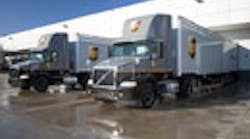It's not much of a surprise that the ongoing economic turmoil – globally and domestically – is hurting both the revenues and earnings of a wide variety of freight transportation companies. What is interesting is that many are managing to stay in the black, albeit by making large cost cuts in operations, capital spending, and a myriad of other areas.
"The continuing deterioration in global economic activity resulted in decreased revenue and profitability in all business segments," said Scott Davis, chairman & CEO of United Parcel Service, adding that the company's revenue was off 13.7% at $10.9 billion in the first quarter this year compared to the same period in 2008. As a result, earnings dropped to 52 cents per share versus 87 cents per share in the first quarter last year.
Still, Davis noted that UPS is maintaining its small package margins, has expanded its market share both domestically and overseas, and continues to generate strong cash flow. However, it is scaling back 2009 capital spending by an additional $200 million, bringing the total to just below $2 billion, he said.
It's not much of a surprise that the ongoing economic turmoil – globally and domestically – is hurting both the revenues and earnings of a wide variety of freight transportation companies. What is interesting is that many are managing to stay in the black, albeit by making large cost cuts in operations, capital spending, and a myriad of other areas.
"The continuing deterioration in global economic activity resulted in decreased revenue and profitability in all business segments," said Scott Davis, chairman & CEO of United Parcel Service, adding that the company's revenue was off 13.7% at $10.9 billion in the first quarter this year compared to the same period in 2008. As a result, earnings dropped to 52 cents per share versus 87 cents per share in the first quarter last year.
Still, Davis noted that UPS is maintaining its small package margins, has expanded its market share both domestically and overseas, and continues to generate strong cash flow. However, it is scaling back 2009 capital spending by an additional $200 million, bringing the total to just below $2 billion, he said.
"We're pleased that our cost control initiatives are on plan and producing the benefits they were designed to achieve. In fact, we have identified $300 million in additional initiatives to help offset some of the recessionary impacts we're experiencing," added Kurt Kuehn, CFO of UPS.
Things are just as rough in the LTL sector, according to Earl Congdon, executive chairman of Old Dominion Freight Line (ODFL). "Industry conditions during the first quarter of 2009 continued to reflect the effects of the recessionary economic environment on freight demand, and pricing pressure was as severe as we have ever experienced," he said in ODFL's first quarter earnings statement – noting that tonnage and operate profitably declined 12.4%.
ODFL's net income dropped to $4 million on revenues of $295.1 million – a far cry from the $10.4 million in earnings on $368.2 million in revenue it posted during the first quarter of 2008. As a result, Old Dominion's operating ratio rose to 96.6% versus 94.3% during the first quarter of 2008.
"Our operating ratio increased in the first quarter primarily because of the deleveraging effect of the decline in tonnage on our fixed costs," Congdon noted. "While we continued to focus on matching direct labor costs with current freight demand, our commitment to maintaining our service schedules and on-time performance resulted in an increase in direct labor costs as a percent of revenue."
Third-party logistics provider C.H. Robinson Worldwide Inc. found business declining in the TL segments it serves, while LTL business ticked up somewhat. As a result, its transportation gross revenue declined 19.7% in the first quarter largely due to falling transportation rates (a result of declining fuel prices, which reduced fuel surcharge revenue) and volume declines in most transportation modes.
C.H. Robinson said gross truck profits – consisting of both TL and LTL services – decreased 1.1%t in the first quarter of 2009, with truckload volumes down approximately 10% while LTL shipments volumes increased approximately 5%. "A significant decline in overall transportation market demand due to the economic recession impacted our volumes," the company noted in its first quarter earnings report.
And the tough market conditions are expected to persist in freight transportation for some time, predicts UPS's Kuehn. "Economic indicators tell us recovery in the U.S. might begin late this year, but more likely not until 2010," he said. "So, we expect the second quarter will be another difficult one." As a result, he anticipates UPS's second quarter earnings will range between 45 and 55 center per share.



